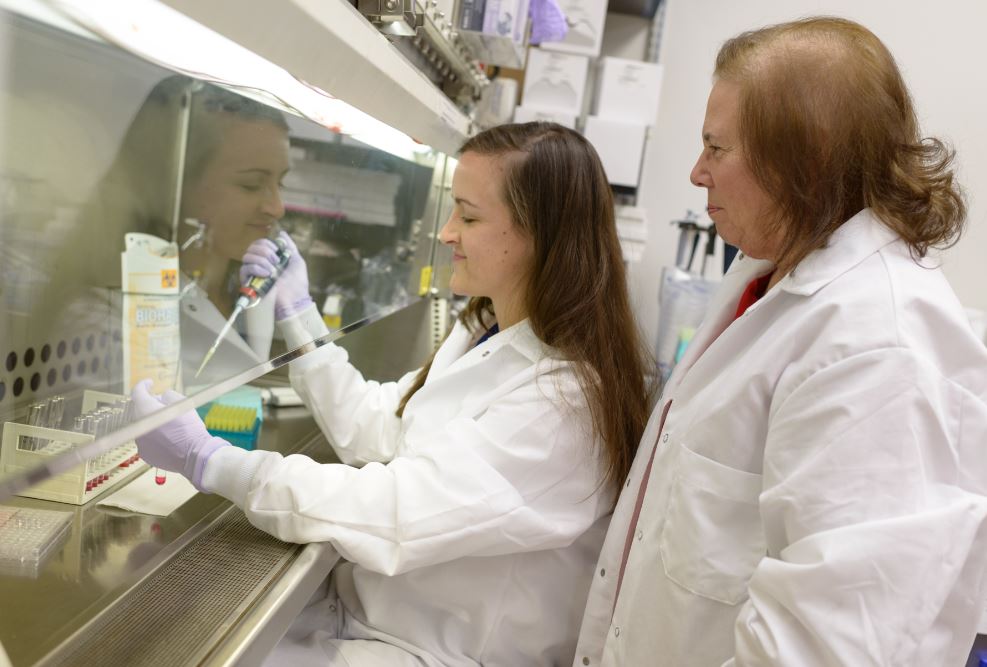UF study: Rare genetic mutation causes resistance to antibiotic used to treat UTIs

Dr. Mary Brown looks on while her graduate student, Marissa Valentine-King, extracts samples of Ureaplasma parvum, a bacteria associated with urinary tract infections. (Photo by Jesse Jones)
Researchers at the University of Florida have identified a rare genetic mutation that causes resistance to the quinolone antibiotic levofloxacin in a bacterium associated with urinary tract infections, or UTIs. The bacterium, Ureaplasma parvum, was isolated from the urine of a woman who experienced a UTI for the first time.
The study was also the first to evaluate antibiotic resistance levels in 180 college-aged women with their first UTIs. It was part of a larger study to determine risk factors for first-time UTI and development of recurrent UTIs.
“UTIs are common in women and account for more than 8 million health care visits a year. To our knowledge, this is the first report of this specific genetic mutation in Ureaplasma in the United States, and only the third report anywhere in the world,” said Dr. Mary B. Brown, a professor in the UF College of Veterinary Medicine’s department of infectious diseases and immunology and corresponding author on the study published in August in Antimicrobial Agents and Chemotherapy.
“Importantly, this study also highlights the integral role of team science in One Health,” Brown said.
Marissa Valentine-King, a doctoral candidate in One Health in UF’s College of Public Health and Health Professions, is mentored by Brown and supported through the UF Clinical and Translational Science Training award from the National Institutes of Health. Valentine-King was recently selected by the blog JPHMP Direct, the online companion site for the Journal of Public Health Management & Practice, as one of the “Students Who Rocked Public Health in 2017”.
Relatively low levels of antibiotic resistance were found overall in the urine samples from the college-age women — possibly because the college-age women were generally healthier and less likely to have conditions that would increase their likelihood for hospitalization and exposure to antibiotics, the researchers speculated. But Valentine-King and Brown say the detection of a new quinolone-resistance mutation is concerning because Ureaplasma species are already intrinsically resistant to penicillin and other beta-lactam antibiotics commonly used to treat UTIs.
“Antibiotic resistance prolongs and complicates UTI treatment,” Brown said. “Most laboratories do not routinely test for Ureaplasmas, and no studies had previously evaluated their resistance levels in college-aged women with a first UTI.”

Marissa Valentine-King, a graduate student working in Dr. Brown’s lab, points out molecular characteristics of mycoplasma associated with UTI infections in women. (Photo by Jesse Jones)
Furthermore, Ureaplasma and its sibling genus, Mycoplasma, members of the Mollicutes family, have an unusual characteristic: they have cell membranes but lack cell walls.
“Antibiotics like penicillin and others that interfere with cell wall synthesis are ineffective against the Mollicutes,” Brown said.
Thus, the resistance to levofloxacin further reduces treatment options for women with UTIs caused by Ureaplasma. But the situation may be worse: the relevant mutation probably causes resistance to other quinolone antibiotics, since it is located in the quinolone resistance region of the gene, Brown said.
However, the mutation is not likely to spread to bacteria other than Ureaplasma or closely related Mycoplasma species because of the unique codon use specific to these bacteria, she added.
Brown said that Ureaplasma with the mutation appeared to be resistant to ciprofloxacin, suggesting that it might be resistant to still other quinolones. However, the procedures for formally establishing resistance to other quinolones have not been conducted.
As a result of their findings, the researchers conclude that the mutation that confers resistance to levofloxacin be added to surveillance programs to inform clinicians of antibiotic resistance in urinary tract pathogens.
“Periodic surveillance can alert providers to changes in regional antibiotic resistance patterns, so they can adjust their empirical treatment selection accordingly to choose the most effective treatment,” Brown said.
Editor’s note: Some content for this story was excerpted from press releases from the American Society for Microbiology and an article posted by the Center for Infectious Disease Research and Policy.













